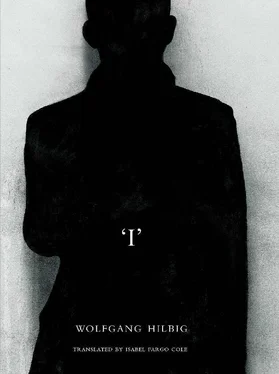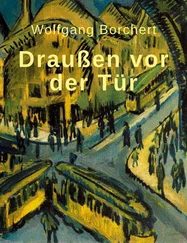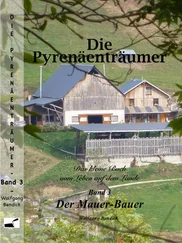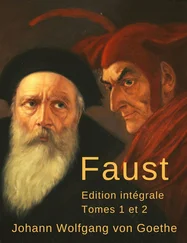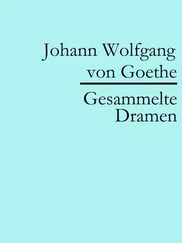I still recalled Cindy’s words vividly: Making a baby in a state like this. . that’s something you can never put right! — They couldn’t have put it right, but they could have put an end to it.
The town must have felt like a cave to me back then, subterranean beneath the unbroken dark brown smoke cover of the night, I recalled; a stooped lanky snoop stood at the counter in the grocery swilling beer, and some elegantly dressed boss ran the town from the living room of his single-family home, and even then my desire had been to crawl underground, the subterranean passages outside town had fascinated me since my childhood. . and clearly everyone in town shared these desires. — I had always wondered how the State, which struck me as comparatively harmless, could inspire the sort of hatred I’d seen in Cindy’s face. What was so astonishing. . so enigmatic about this state was none of the things that were constantly discussed there: it wasn’t the advantages which its citizens, for all their dissention, managed to obtain themselves, the secret advantages and the public ones (the so-called social achievements); it wasn’t its post-war situation either, to which it clung tenaciously; nor its servility, its lies, its vainglory, its vanity and foolishness. . the enigma was the hatred which it had fostered, invisible, always hidden, buried, as it were, beneath this land’s eroded air. And which no one noticed, because there seemed to be no compelling reason for it. The mere mention of the word hatred made people wince. . it was an emotion which was ascribed implicitly only to the country’s enemies. And yet it had germinated here in this soil, and under the dull, everyday surface it had prospered. . this hatred expressed itself for now in infinite indifference, and blossomed beneath the depression. Indeed, as its official representatives proclaimed, this land was a blooming land. . but the bloom was toxic, an ugly, tenacious, deep-rooted bloom of slime, and it was hidden to the eye. The reasons for this hatred were not the government’s unsustainable or broken promises, not the blindness and sycophancy of its representatives, not the fraudulent elections, perhaps not even the Wall, the police, the Party bigwigs with their double standards and cowardice. . the reason for this hatred was us (and I winced at the thought). — We, the blurry little low-down tireless shadows that clung to the people of this country — we were the sustenance of this hatred. We’d done no one any harm. .
We’d done no one any harm, but we’d snooped into the human soul. We had divided them into fit and unfit souls. . into ones we could use and ones we couldn’t (the internment camps for the latter existed only on paper and only in case things got serious. . but life in this country never got serious).
We’d done no one any harm, but our shadowy presence, our constant presence, like the ill-favoured, bad-smelling, badly suppressed semblance of each individual’s soul, our covert existence was the trigger and the object of this hatred, we were the very hatred each person out there held. We were the shadow of life, we were death. . we were the dark side of man turned flesh, turned shadowflesh, we were hatred isolated. ‘I’ was hatred. .
We’d done no one any harm, but we had placed the people at a crossroads where we counted them off: all we could use were the informers. .
We were the shadow of existence, we were the genitive of the person. . we were the practice of the disruption measures to be implemented, we were the achieved results of the given intelligence operation, the stipulation of the life of the soul of the person, we were the hand and the head of the report of reports on reporting, we were the brief movements of the lower face.
Was I capable now of altering this condition?
No, I had to admit, in all probability I was no longer capable. I had made one attempt: I had wanted to unmask myself — presumably! — before the student, myself and Operation: Reader. . I now thought it possible that I had simultaneously been his operation. . it had backfired on me, it had been taken out of my hands. Now all I could do was wait. . for what? What all of them were waiting for, Kesselstein, Reader, the literati. . like me they all gazed into some dark, tortuous labyrinth and awaited their expulsion from the darkness. The literati had resigned themselves in unprecedented fashion. . and the powers that be had resigned themselves as well. . and so they huddled peaceably, clutching one another’s filthy paws. . and waited. — The powers that be had disappointed the literati, and the literati had disappointed the powers that be; they had no cause to reproach each other. And Reader had disappointed and deceived Unofficial Literature as a whole. . and thus me as well. And in the process had done me the great favour of allotting me to literature. He had indicated that I should wait like the others. . I could sit where I was and wait.
Somewhere, suddenly, there’d been footsteps in the passages. It wasn’t the first time I’d thought I heard them, several people’s footsteps, for a year now I’d believed I was being frequented down here. I knew, not just from Kesselstein, that so-called public-order groups had emerged of late, goon squads, plain and simple, recruited among criminals who were promised reprieves as long as they functioned, cleaning things up if a coalition movement cropped up anywhere. I swallowed my last two tranquilizers and sank back into my prenatal posture on the produce crate. . the steps kept coming closer. I unscrewed the forty-watt bulb from its socket and hurled it against the wall. Again I sat down in the dark and listened. It had been a mere dull crack, not enough to scare them, the steps grew more distinct. I picked up the two bags and groped my way towards the light I saw glimmering around the next bend, perhaps a hundred yards away. — The passageway must have branched off there at one point, it had been walled off, and a large piece had broken out of the barrier: from this opening — I had never dared to enter the hole — the densest darkness poured out at me, and a smell that filled me with dread. Sometimes I’d thought I saw a red gleam in this cave, I hit on the idea that the pieces of my red armchair had been hidden there, after being cut apart and searched. Now the hole was pitch black, and smelt of faeces and putrefaction, of putrefying flesh dissolving in a sludge of faeces. And it was from this hole I seemed to hear the steps. . there was a ticking and dripping in there, a tapping like steps in the darkness, they came closer, and their shuffle set off echoes. Suddenly I had the vision that at any moment Harry Falbe’s son would appear at the edge of the opening: four years old now, blind, white as chalk and covered with filth and scabs. — Thus he would re-emerge, a Kaspar Hauser of the new generation we had begotten. — The tranquilizers hadn’t kicked in yet, I felt sick and took flight. The first basement door I tried to flee through was locked. I couldn’t open it, I ran on. The next basement door — to the basement of the building I’d once lived in — was open. . I had scrupulously left it open each evening until no one thought of locking it any longer. It was already dark out, cold and overcast, single snowflakes fell, the frost brought me back to my senses. Upstairs, where I once had lived, on the fifth or sixth floor, the light was burning.
.
.
***
With my bags, I travelled to A.; my time in Berlin began fading from my mind even in the train compartment. It was as though I were thinking back on a chain of events, soon confused and impossible to survey, which hadn’t actually happened with my participation. And for that reason this chain thinned out, growing more and more fragmentary. . I had merely stood nearby, invisible to others, shrouded in a diffuse sphere of shadows from which I gazed into a space of light: it swarmed with movement I failed to grasp. . I was looking from outside into a lit room, I thought, whose closed windows conveyed to the outside not a word of the conversations held in there. And all the figures whom I’d met in Berlin, whom I’d followed, of whose endless speeches I had apprehended only the ecstatic movements of the mouth, all these people had been lost to me along with this time. — Suddenly I could think only in strangely old-fashioned and literary terms: the story of Cindy and Harry and their child. . was it a tragedy? I would have been content if I could have answered in the affirmative. There was simply nothing you could do about tragedies. . there was no point in posing yourself any questions of guilt. Not yet. .
Читать дальше
